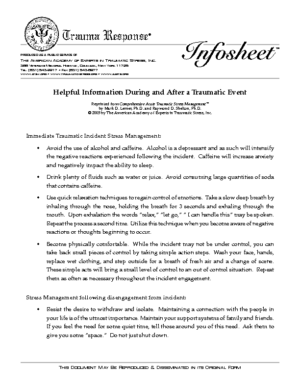In the aftermath of the Las Vegas mass shooting, coping with psychological trauma and managing stress will be significant challenges for survivors.

Emotional, cognitive, and behavioral reactions are often experienced by people during and after a traumatic event. It is important to recognize that these reactions do not necessarily represent an unhealthy response; rather, they may be viewed as normal responses to an abnormal event. However, when these reactions are (a) prolonged for extended time periods, (b) accompanied by other symptoms such as recurring nightmares, flashbacks, or avoidance behaviors, or (c) interfere with social interactions, work performance, or other activities of daily living, stress management and coping strategies are vital to a person’s well-being.
The following tips and advice published by The American Academy of Experts in Traumatic Stress, Inc., may be helpful during and after a person experiences a traumatic event.
Stress Management During an Incident
- Avoid the use of alcohol and caffeine. Alcohol is a depressant and as such will intensify the negative reactions experienced following the incident. Caffeine will increase anxiety and negatively impact the ability to sleep.
- Drink plenty of fluids. Water or juice are the best options.
- Use quick relaxation techniques. To regain control of emotions, take a slow deep breath by inhaling through the nose, holding the breath for 3 seconds and exhaling through the mouth.
- Become physically comfortable. If possible, wash your face and hands, step outside for a breath of fresh air, or change your scenery.
Stress Management After an Incident
- Resist the desire to withdraw and isolate. Maintain your support systems of family and friends. If you feel the need for some time alone, ask others to give you some “space”. Don’t just shut down.
- Engage in simple exercise. Basic activities such as walking, biking, and swimming will help dissipate the stress reactions caused by the incident.
- Limit exposure to the news. Constant exposure to the incident through media will continue to trigger negative reactions as the event unfolds over and over.
- Maintain a normal schedule. Traumatic incidents disrupt the sense of normalcy. By maintaining a normal schedule as much as possible, you protect some degree of a normal existence.
- Be aware of your feelings and talk about them. Keep a journal and write your thoughts, or share your feelings with someone you can trust.
- Understand “it is OK to not be OK”. Remember that adverse reactions and symptoms are normal after experiencing a traumatic event.
- Seek professional assistance. If your symptoms persist or become worse, contact a licensed counselor. You can reach out to a stress-management specialist by calling 248-691-9034 or by sending an e-mail to mycare@caremattersllc.com.

